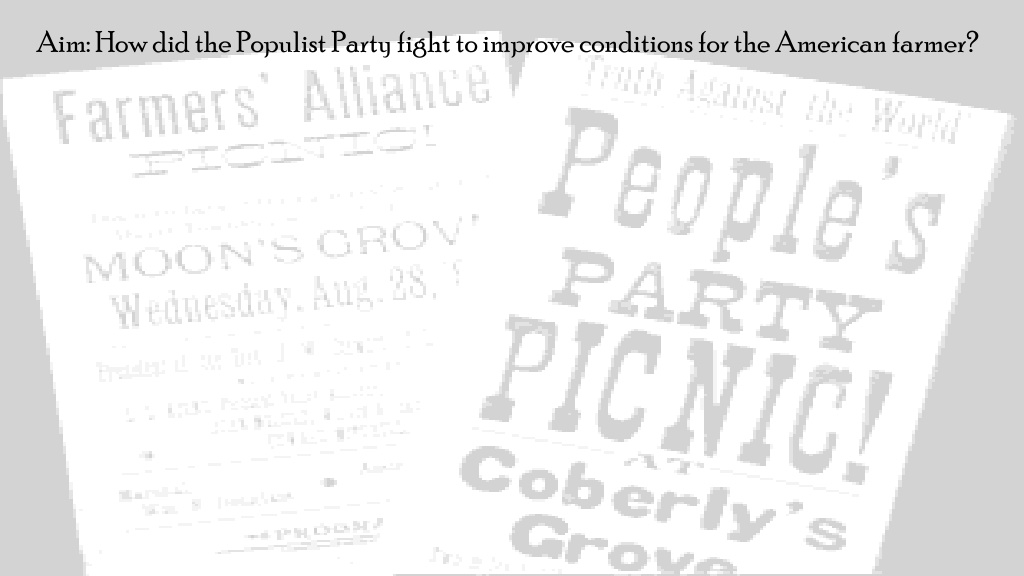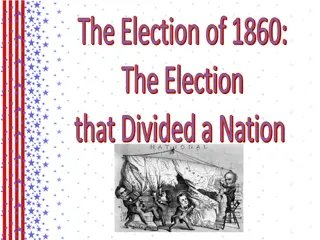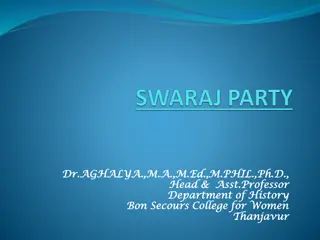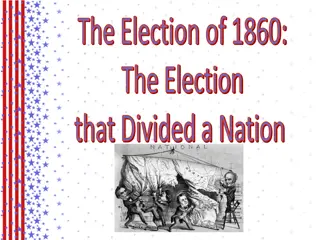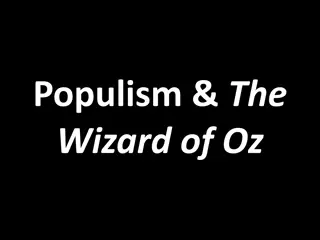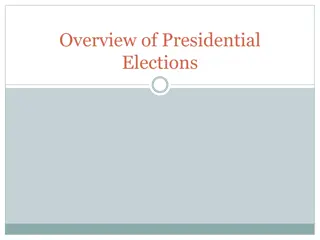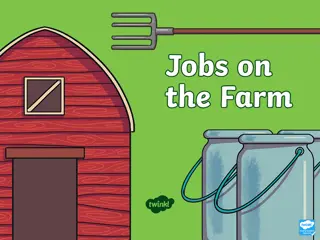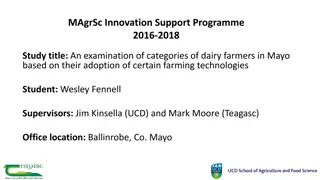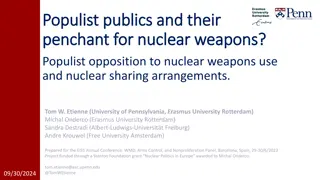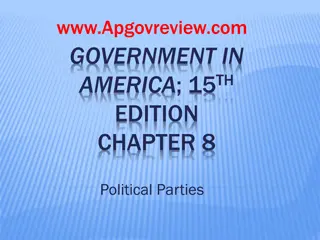The Populist Party's Fight for American Farmers
The Populist Party emerged as a champion for American farmers who were facing economic hardships such as low crop prices, increasing debt, and unfair railroad charges. Through the Grange organization, farmers demanded reforms like regulating railroads, implementing bimetallism, and advocating for political changes. The party aimed to improve conditions for farmers and garnered support by addressing labor issues and advocating for political reforms.
Download Presentation

Please find below an Image/Link to download the presentation.
The content on the website is provided AS IS for your information and personal use only. It may not be sold, licensed, or shared on other websites without obtaining consent from the author.If you encounter any issues during the download, it is possible that the publisher has removed the file from their server.
You are allowed to download the files provided on this website for personal or commercial use, subject to the condition that they are used lawfully. All files are the property of their respective owners.
The content on the website is provided AS IS for your information and personal use only. It may not be sold, licensed, or shared on other websites without obtaining consent from the author.
E N D
Presentation Transcript
Aim: How did the Populist Party fight to improve conditions for the American farmer?
When the farmer comes to town When the farmer comes to town With his wagon broken down, With his wagon broken down, The farmer is the man who feeds them all. The farmer is the man who feeds them all. If you'll only look and see, If you'll only look and see, I am sure you will agree, I am sure you will agree, The farmer is the man who feeds them all. The farmer is the man who feeds them all. The farmer is the man, the farmer is the man, The farmer is the man, the farmer is the man, Lives on credit till the fall, Lives on credit till the fall, Then they take him by the hand, Then they take him by the hand, And they lead him from the land, And they lead him from the land, And the middleman's the man who gets it all. And the middleman's the man who gets it all. When the banker says he's broke, When the banker says he's broke, And the merchant's up in smoke, And the merchant's up in smoke, The farmer is the man who feeds them all. The farmer is the man who feeds them all. It would put them to the test It would put them to the test If the farmer took a rest. If the farmer took a rest. The farmer is the man who feeds them all. The farmer is the man who feeds them all. The farmer is the man, the farmer is the man, The farmer is the man, the farmer is the man, Lives on credit till the fall, Lives on credit till the fall, His clothes are wearing thin, His clothes are wearing thin, His condition is a sin; His condition is a sin; He's forgot that he's the man who feeds them all. He's forgot that he's the man who feeds them all. When the lawyer hangs around When the lawyer hangs around While the butcher cuts a pound, While the butcher cuts a pound, The farmer is the man who feeds them all. The farmer is the man who feeds them all. And the preacher and the cook And the preacher and the cook Go a Go a- -strolling down the brook, strolling down the brook, The farmer is the man who feeds them all. The farmer is the man who feeds them all. The farmer is the man, the farmer is the man, The farmer is the man, the farmer is the man, Lives on credit till the fall. Lives on credit till the fall. With the interest rate so high, With the interest rate so high, It's a wonder he don't die; It's a wonder he don't die; The banker is the man who gets it all. The banker is the man who gets it all. Questions: 1. According to the poem, which groups of people are being neglected from American politics? 2, What problems is this group facing? (Use text based evidence as support) 3. Who does the author of the poem believe is the backbone of this country? Why?
The Populist Party The Populist Party Farmers, facing economic problems, form the Grange fighting for reform. These problems included: Lower prices for crops Farmers had no cash . . .went further into debt. . . foreclosed on mortgages Railroads charged outrageous prices to ship crops (no regulation!) Grange, an organization of farmers
The Populist Party The Populist Party Farmers demanded reform which included: Regulate the railroad companies! (stop them from charging such high rates) Bimetallism - make cash more available (back the dollar with silver, not gold, so dollar will be worth less) Political demands: single term for President and Vice-President; secret ballot; popular election of Senators To get industrial workers to support them: 8-hour workday; restrict immigration
Cross of Gold Speech Cross of Gold Speech William Jennings Bryan William Jennings Bryan Stepping into the debate, the Populist Party called for bimetallism and free coinage of silver. Yet their strategy was undecided: should they join forces with sympathetic candidates in the major parties and risk losing their political identity, or should they nominate their own candidates and risk losing the election? As the 1896 campaign progressed, the Republican Party stated its firm commitment to the gold standard and nominated Ohioan William McKinley William McKinley for president. After much debate, the Democratic Party came out in favor of a combined gold and silver standard, including unlimited coinage of silver. At the Democratic convention, former Nebraska congressman William Jennings Bryan Bryan, editor of the Omaha World-Herald, delivered an impassioned address to the assembled delegates. An excerpt of what has become known as the Cross of Gold speech follows. William Jennings Having behind us the producing masses of this nation and the world, supported by the commercial interests, the laboring interests, and the toilers everywhere, we will answer their demand for a gold standard by saying to them: You shall not press down upon the brow of labor this crown of thorns, you shall not crucify mankind upon a cross of gold. With McKinley s election, Populism collapsed, burying the hopes of the farmers. The movement left two powerful legacies, however: a message that the downtrodden could organize and have political impact, and an agenda of reforms, many of which would be enacted in the 20th century.
Supreme Court Cases on Granger Laws (1877, 1886) Supreme Court Cases on Granger Laws (1877, 1886) In 1877, six cases, now known as the Granger cases, came before the United States Supreme Court. They tested the laws that various states had passed in support of farmers. The first and most important was Munn v. Illinois. It is considered a landmark in United States constitutional law. The Illinois Legislature had passed a law allowing a maximum rate for storing grain in Chicago warehouses. The Illinois State Supreme Court had then overturned the law. The United States Supreme Court in 1877 reversed the lower court s decision and found the law to be constitutional. The United States Supreme Court declared that grain elevators were public utilities. As such, they affected the public interest and could be regulated by the state. By 1886, national interests had shifted. The Granger Movement was no longer strong. Railroads were using bribery and threats, such as cuts in service, to force state legislatures to repeal the Granger laws. The final blow to the Granger laws was the Wabash Case. This time the United States Supreme Court struck down a ruling by the Illinois State Supreme Court against the railroads. The United States Supreme Court in 1886 ruled that states could not regulate the rates charged by railroads that crossed state boundaries Because most railroads were interstate lines, this ruling effectively ended efforts by states to control transportation rates. To fill the void left by the United States Supreme Court ruling, Congress passed the Interstate Commerce Act of 1887, which allowed federal regulation of interstate lines and established the Interstate Commerce Commission. Questions: Questions: 1. Why was the Munn vs. Illinois court case considered landmark Supreme Court case? 2. What was the position of the United States Supreme Court in their decision in Wabash vs. Illinois regarding the interstate commerce clause of the United States Constitution?
Supreme Court Cases on Granger Laws (1877, 1886) Supreme Court Cases on Granger Laws (1877, 1886) Supreme Court cases such as Munn v Illinois Congress to step in and establish the Interstate Commerce Act up to regulate railroads and interstate commerce. Munn v Illinois and Wabash v Illinois Interstate Commerce Act, which was an agency set Wabash v Illinois paved the way for
Supreme Court Cases on Granger Laws (1877, 1886) Supreme Court Cases on Granger Laws (1877, 1886) 1. Munn v. Illinois (1877) Supreme Court uphold the state s regulation of railroads for the benefit of consumers and businesses consumers and businesses
Supreme Court Cases on Granger Laws (1877, 1886) Supreme Court Cases on Granger Laws (1877, 1886) 2. Wabash v. Illinois (1886) Supreme Court decision that severely limited the rights of states to control interstate commerce. It led to the creation of the Interstate Commerce Commission. Commission. Interstate Commerce
Apply your knowledge Apply your knowledge What role do third parties play in American politics? Address concerns that major political parties ignore Usually formed by special interest groups Do not last long, their policies, if they become popular, are usually adopted by one of the major political parties.
